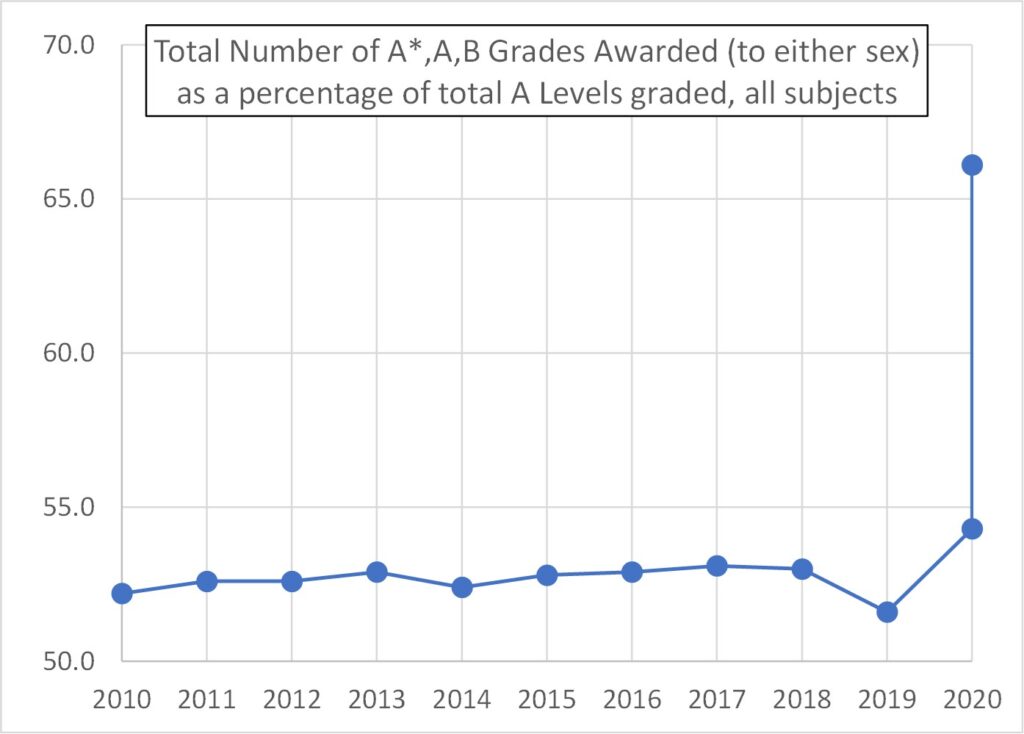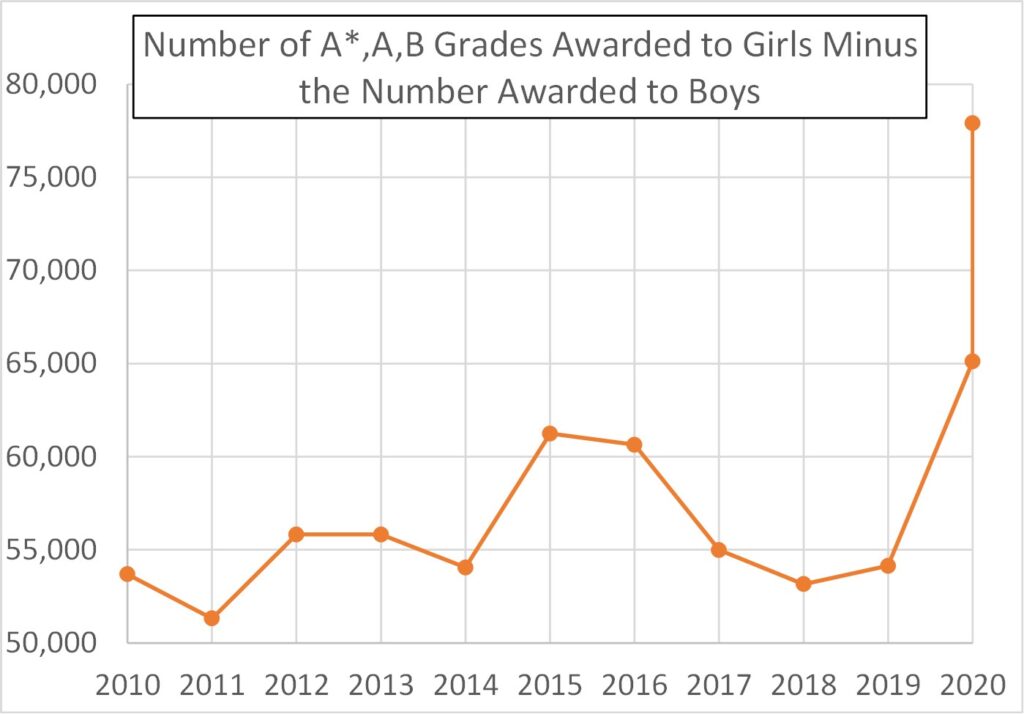
I don’t know what outbreak of wild optimism drove me to title my recent blog “A Levels 2020: The Year of Utter Nonsense”, as if the nonsense of examless awards was destined to be confined to just the one year. It seems not.
The Welsh Government has announced that there will be no GCSE, AS or A Level exams in 2021 either. The Scottish Government have also cancelled the 2021 “National 5” exams (roughly GCSE equivalents) and the Greens (never to be outdone) have called for all exams in Scotland to be cancelled. Education Secretary, John Swinney, responded by referring to the “significant weight” attached to Highers in university admissions, and hence that they should be maintained if at all possible. We await whether he will find it “at all possible”.
Inevitably there are calls for England to follow suit and, like Wales, cancel all school exams in 2021. What’s the betting?
Let me remind you of what happened this year – concentrating on A Levels. (All data herein has been taken from Brian Stubbs’s site Student Performance Analysis).
The Government’s first idiotic mistake was thinking they could bestow graded awards without exams and without controversy (give me strength). But at least to begin with there were sane people somewhere within the process who moderated the teachers’ assessments so that the latter’s preposterously inflated grading was brought down to something vaguely credible. I illustrate this in Figure 1 which shows the proportion of candidates getting the top grades (A*,A,B) over the last eleven years, across all subjects. This had been 52% to 53% for ten years. The initially declared grades, duly moderated by what became vilified in the media as an “algorithm”, kept the grade inflation down to reasonable proportions, resulting in about 54% of candidates getting the top grades (the lower point shown below for 2020).

But following a media shit storm and whinges from aggrieved pupils (surprise!) the ever-steadfast and imperturbable Johnson Government capitulated and replaced the initially moderated results with the raw teacher assessments. Figure 1 shows what happened without any more commentary from me being necessary. This phenomenon was duplicated across all subjects to a greater or lesser degree.
This is bad, of course, because it means that standards have been chucked out of the window. But there is worse.
Reliance on teachers’ assessments alone opens the door to subjective bias, personal animosities and ideological motives. And we know that teachers tend to mark boys down relative to girls compared with objective assessments (see The Empathy Gap, chapter 2). So what did the use of unmoderated teachers’ assessments do for the relative fortunes of boys and girls – compared with previous years?
Firstly, let’s look at absolute numbers. For decades there have been more girls than boys achieving top A Level grades (A*,A,B). In 2019 there were just under 55,000 more, and over the ten years 2010 – 2019 between 51,000 and 61,000 more girls than boys achieved A*/A/B grades. This year, based on the unmoderated teachers’ assessments (the final awards) the excess of girls over boys gaining these top grades shot up to 78,000 (Figure 2).
Since top A Level grades are the most significant issue in university admission, we can expect last year’s 37% dominance of women over men starting university to be substantially greater still this year. (Data is usually released in December).

Now let’s look at the percentages of candidates of each sex awarded the highest grades (A* and A) this year (2020) compared with last year (2019). The data for physics is shown in Table 1. In 2019 there were similar percentages of girls and boys awarded A/A* grades (28.7% cf 27.6%). But based on teachers’ assessments in 2020 the percentages of candidates awarded A/A* grades in physics shot up to 46.4% of girls and 40.5% of boys. Both sexes were subject to wild grade inflation – but the increase in A/A* awards to girls was substantially greater than that to boys.
Table 1: Percentage of Candidates Awarded A/A* grades by Sex (Physics)
| Physics | girls | boys | girls – boys |
| 2020 teacher assessment | 46.4 | 40.5 | 5.9 |
| 2020 algorithm moderated | 34.3 | 30 | 4.3 |
| 2019 exam | 28.7 | 27.6 | 1.1 |
If we are content to regard the exam-based results in 2019 as an objective measure, which seems reasonable, then we can use these data as a gauge of teachers’ bias in favour of girls. Bias is thus defined as the excess of the percentage of girls over the percentage of boys gaining A or A* grades in 2020 (based on teacher assessments) minus the excess of the percentage of girls over the percentage of boys gaining A or A* grades in 2019 (based on exam results). Expressed algebraically,

where G is the percentage of girls awarded A/A* grades, B
is the percentage of boys awarded A/A* grades, and subscript TA denotes teachers’ assessments (in 2020) whereas subscript Ex denotes exam based results (in 2019). In other words, the bias is defined as how much the girls’ advantage has increased as a result of being assessed by teachers rather than by exam.
Bias can (potentially) be in either direction. A positive bias means bias in favour of girls, whereas a negative bias means bias in favour of boys.
Hence, from Table 1 we see that the bias in physics was 5.9% – 1.1% = 4.8%.
Table 2 lists the bias calculated in this manner for all subjects.
Every single one is positive. Every subject without exception is biased in favour of girls.
This is particularly egregious as girls do substantially better than boys anyway, i.e., before 2020 and based on exams.
One counter to the interpretation of Table 2 as indicating bias in favour of girls is to assume the teachers’ assessments are fair whereas the exam-based awards are unfair because girls under-perform in exams. However, this view flounders on the observation that girls already do better than boys even when based on exams. Consequently this interpretation would also need to postulate either that boys are intrinsically academically inferior to girls (which conflicts with IQ data) or that there is some other disadvantage to boys elsewhere within the education process which brings about their poorer performance – which simply brings us back to teachers again.
I would contend that the interpretation of Table 2 is clear, and the lack of concern about this phenomenon of bias is fully consistent with how it arises as an endemic societal prejudice.
The result is that, across all subjects, boys were awarded 36,311 more A/A* grades in 2020 than in 2019, due to teachers’ inflating of grades, but the corresponding figure for girls was 60,704. So what this really means, in terms of the competition for top grades and hence the competition for places at the best universities, is that an excess of 24,393 A/A* grades have been awarded to girls due entirely to teacher bias.
Table 2: Teacher Bias in Grading
| Subject | Bias (percentage) |
| Art & Design | 3.4 |
| Biology | 0.8 |
| Business | 2.5 |
| Chemistry | 1.9 |
| Classics | 5.4 |
| Computing | 8.4 |
| Drama | 2.8 |
| Design & Technology | 5.2 |
| Economics | 4.5 |
| English Language | 4.3 |
| English Literature | 2.9 |
| French | 1.0 |
| Geography | 6.1 |
| German | 0.3 |
| History | 5.7 |
| Law | 0.8 |
| Maths | 6.1 |
| Further Maths | 5.0 |
| Media | 6.6 |
| Music | 4.3 |
| Physics | 4.8 |
| Politics | 1.9 |
| Psychology | 4.8 |
| Religious Studies | 2.0 |
| Sociology | 4.1 |
| Spanish | 0.8 |
| Sports & PE | 8.4 |
| Other Subjects | 2.3 |
| All Subjects | 3.2 |
Will the practice of doing away with exams and basing grades entirely on teachers’ assessments persist, not just in 2021 but indefinitely? It’s hard to see how to pull back from it. If exams are reintroduced – to the same standard as in 2019 – there will be further howls of anguish from pupils who feel hard done by compared with the 2020, and perhaps 2021, cohorts who have reaped the bounty of massive grade inflation.
One thing is for sure – the staringly obvious bias against boys which basing grading on teachers’ assessments produces will be no deterrent to its permanent adoption – quite the opposite.